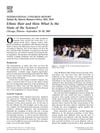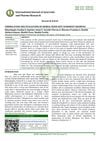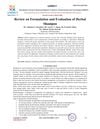 4 citations,
January 2021 in “Skin appendage disorders”
4 citations,
January 2021 in “Skin appendage disorders” Trichodynia is a painful scalp condition not directly linked to the amount or type of hair loss and may involve psychological factors, with treatments showing mixed results.
 16 citations,
December 2012 in “The Clinical Journal of Pain”
16 citations,
December 2012 in “The Clinical Journal of Pain” Chronic scalp pain in trichodynia involves both body-wide and localized increased pain sensitivity.
 4 citations,
March 2020 in “Cutaneous and ocular toxicology”
4 citations,
March 2020 in “Cutaneous and ocular toxicology” Wen by Chaz Dean Sweet Almond Mint Cleansing Conditioner is better tolerated than salicylic acid and baby shampoos.
August 2024 in “Cosmetics” Peanut callus extract helps grow hair and prevent hair loss.
 31 citations,
October 2012 in “Dermatologic clinics”
31 citations,
October 2012 in “Dermatologic clinics” Cosmetic hair products are important for hiding hair loss and improving satisfaction when combined with medical treatments.
 80 citations,
March 2008 in “Contact Dermatitis”
80 citations,
March 2008 in “Contact Dermatitis” Nearly half of the French individuals surveyed reported having a sensitive scalp, more common in women, often linked to hair loss and symptoms like itching, and triggered by factors including shampoos and pollution.
40 citations,
January 2018 in “International journal of trichology” Healthy scalp reduces hair loss by managing oxidative stress.
 September 2023 in “International journal of drug delivery technology”
September 2023 in “International journal of drug delivery technology” The herbal shampoo effectively cleans and controls fungal growth.
 2 citations,
May 2002 in “Clinics in Dermatology”
2 citations,
May 2002 in “Clinics in Dermatology” Ethnic differences in hair and skin are significant and under-researched, requiring tailored dermatologic treatments and more study.

Hair product allergies are common, especially to hair dyes, and hairdressers are at higher risk.
 37 citations,
May 1999 in “Australasian Journal of Dermatology”
37 citations,
May 1999 in “Australasian Journal of Dermatology” Early diagnosis and treatment are crucial for preventing permanent hair loss in various scalp conditions, and while new treatments are promising, more research is needed to evaluate their effectiveness.
 July 2014 in “Elsevier eBooks”
July 2014 in “Elsevier eBooks” The document concludes that various hypersensitivity diseases in horses can be diagnosed and treated with methods like immunotherapy and medication, and early aggressive treatment is crucial for severe diseases like equine cutaneous pythiosis.
 9 citations,
March 2022 in “Antioxidants”
9 citations,
March 2022 in “Antioxidants” Synthetic antioxidants are effective, cheap, and stable, with some like zinc and cholecalciferol reducing child and cancer deaths, but the safety of additives like BHA, BHT, TBHQ, and PEG needs more research.
 January 2023 in “International journal of Ayurveda and pharma research”
January 2023 in “International journal of Ayurveda and pharma research” The herbal shampoo is effective and safe for use.
 April 2024 in “International Research Journal Of Modernization In Engineering Technology And Science”
April 2024 in “International Research Journal Of Modernization In Engineering Technology And Science” Herbal shampoos are effective, non-toxic alternatives for treating dandruff and hair fall.
 89 citations,
January 2013 in “Acta dermato-venereologica”
89 citations,
January 2013 in “Acta dermato-venereologica” The document concludes that dandruff and seborrheic dermatitis are linked to inflammation and skin changes, and treating them with specific shampoos can reduce these issues.
 January 2023 in “International Journal of Research Publication and Reviews”
January 2023 in “International Journal of Research Publication and Reviews” Some herbal ingredients like linalool and tea tree oil have anti-dandruff properties and are safe for use in shampoos.
37 citations,
October 2017 in “Saudi pharmaceutical journal” All evaluated shampoos meet Saudi standards.
51 citations,
January 2014 in “International journal of trichology” Shampoo pH can affect hair health, with alkaline shampoos potentially causing damage and acidic shampoos reducing frizz.
 January 2020 in “Journal of Pharmacognosy and Phytochemistry”
January 2020 in “Journal of Pharmacognosy and Phytochemistry” The VCO-based herbal hair tonic is effective, safe for hair loss treatment, and can be mass-produced.
 January 2020 in “Revista da Sociedade Portuguesa de Dermatologia e Venereologia”
January 2020 in “Revista da Sociedade Portuguesa de Dermatologia e Venereologia” Frontal fibrosing alopecia in Brazil mostly affects postmenopausal women, often linked with hypothyroidism and eyebrow hair loss.
 1 citations,
July 2023 in “Cureus”
1 citations,
July 2023 in “Cureus” Some treatments for hereditary hair loss are effective but vary in results and side effects; new therapies show promise but need more research.
4 citations,
January 2011 in “International Journal of Trichology” Treating scalp issues in hair-pulling disorder helps hair regrow and reduces itch.
 1 citations,
November 2023 in “International Journal For Multidisciplinary Research”
1 citations,
November 2023 in “International Journal For Multidisciplinary Research” Herbal shampoos are safer and perform well, but need more research to improve quality.
 March 2024 in “International Journal of Advanced Research in Science, Communication and Technology”
March 2024 in “International Journal of Advanced Research in Science, Communication and Technology” Herbal shampoos with plant-based ingredients can effectively promote hair growth, treat dandruff, and add shine.
 April 2021 in “Advances in Cosmetic Surgery”
April 2021 in “Advances in Cosmetic Surgery” Hair restoration can be achieved through non-surgical treatments like minoxidil, antiandrogens, phototherapy, and PRP procedures, or through surgical methods like hair transplantation. Continued treatment is needed to maintain results, and full results are visible after 12-18 months.
 December 2023 in “International Journal of Newgen Research in Pharmacy & Healthcare”
December 2023 in “International Journal of Newgen Research in Pharmacy & Healthcare” Both herbal and synthetic shampoos in India are generally safe and effective.
 January 1987 in “Side effects of drugs annual”
January 1987 in “Side effects of drugs annual” Some cosmetics and dermatological drugs can cause allergic reactions and side effects, like skin irritation and systemic issues.
 July 2011 in “Springer eBooks”
July 2011 in “Springer eBooks” The document concluded that FDA-approved treatments like minoxidil and finasteride are effective for hair loss, while the effectiveness of natural remedies and other non-approved treatments is not well-supported by evidence.
 1 citations,
October 2021 in “Indian Journal of Plastic Surgery/Indian journal of plastic surgery”
1 citations,
October 2021 in “Indian Journal of Plastic Surgery/Indian journal of plastic surgery” Proper hair care and safe use of hair products are crucial for those with hair loss.

























